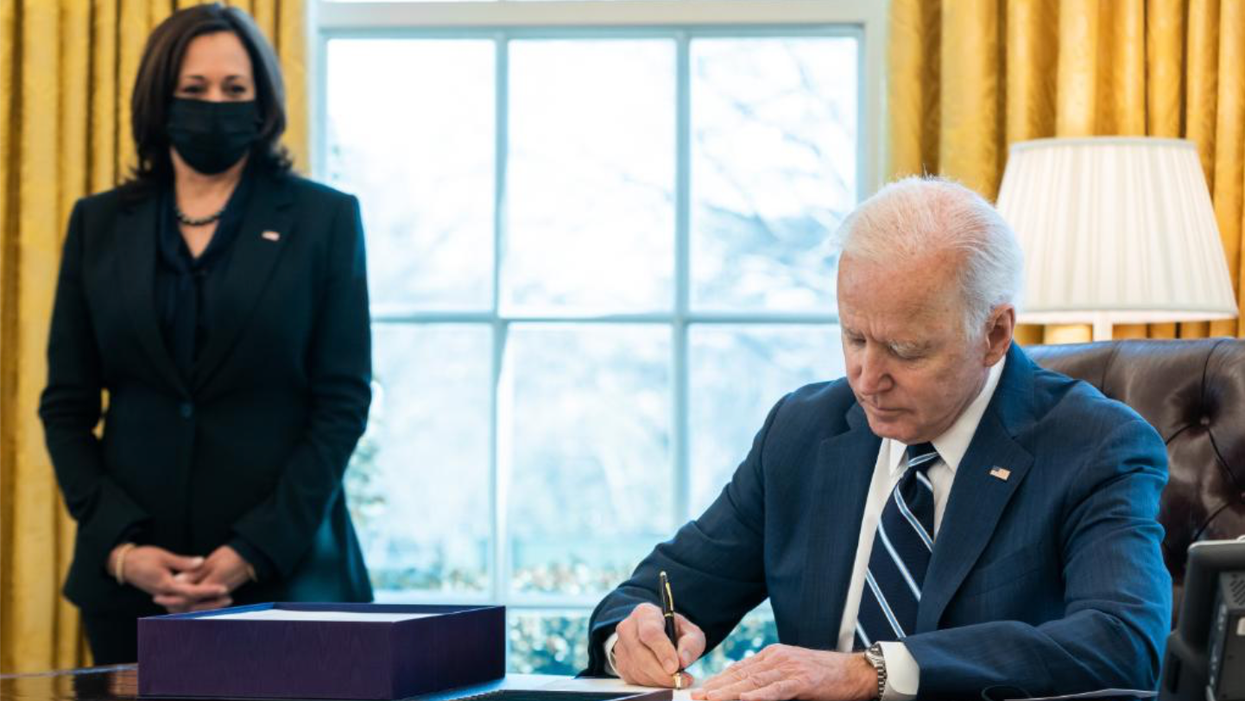Biden’s Rescue Plan Restores Veterans’ Aid Cut By Trump

President Biden signing the American Rescue Plan with Vice President Harris.
Reprinted with permission from American Independent
The $1.9 trillion COVID relief plan signed into law by President Joe Biden on Thursday contains a number of provisions that will provide new help to veterans struggling due to the pandemic.
U.S. veterans have suffered enormously during the pandemic, experts say. A Wounded Warrior Project survey last spring found that more than half reported worse mental health since the establishment of social distancing measures, and, according to an NBC report, the VA's mental health crisis line received 15% more calls in 2020 than in the previous year.
They are also among those who have experienced unemployment, a housing crisis, and extreme food instability during the pandemic, with some areas seeing food bank demand doubled for the military community in 2020.
The American Rescue Plan will bring relief to veterans by allocating $17 billion to the VA, including $14.4 billion for physical and mental health care and $750 million for housing construction and repair.
The law will allocate $50 billion to housing and rental assistance and $400 million to a job training program for veterans.
The Veteran Rapid Retraining Program offers veterans 12 months of direct payments once they enroll in an approved job-training program. It also provides full tuition payments to their program at no cost to the veteran and a monthly basic housing allowance that equals that of a married, E-5 active-duty soldier.
The program aims to provide job training for more than 17,000 veterans.
The relief will fill gaps in support exacerbated by repeated moves by the Donald Trump administration to slash veterans' benefits and health care.
Throughout his time in office, Trump waged war on programs such as Medicare, Medicaid, the Supplemental Nutrition Assistance Program, and Social Security, all heavily relied upon by veterans.
Nearly one in 10 veterans receives health care through Medicaid, according to the House Committee on the Budget, and more than half have insurance coverage under Medicare. More than 620,000 rely on Social Security benefits, and 1.3 million veteran households receive SNAP food stamp benefits.
In 2019, the Trump administration rolled out policy changes that would have imposed work requirements on SNAP recipients, which would have had a disastrous impact on low-income Americans, including veterans, during the pandemic if advocates hadn't effectively blocked them. They would have cut SNAP funding to at least 700,000 Americans.
The Trump Department of Agriculture fought a lengthy battle in federal court to prevent states from administering emergency food stamps to low-income Americans.
In February 2020, just before onset of the COVID-19 pandemic, Trump released a $4.8 trillion budget proposal that contained sharp budget cuts across the board, particularly to Medicare and Medicaid. The House Committee on the Budget issued a statement days later on the harm it would cause veterans by decreasing funding for these crucial programs.
Trump also made repeated attempts to cut Social Security benefits. He signed an executiveorder in August 2020, during a peak in the pandemic, that established a temporary deferral through December of that year for employees under a certain income level of payment of the portion of the payroll tax that funds Social Security, and pledged to make them permanent if he was reelected.
Trump also exacerbated an enormous staffing crisis within the Department of Veteran Affairs, which provides physical and mental health services to veterans. He enacted hiring freezesimpacting the VA and also cut the Interim Staffing Program, which assigned physicians, nurse practitioners, and assistants to VA hospitals and health care centers when permanent staff went on leave or retired.
When David Shulkin, the first veteran affairs secretary under Trump, took office, he vowed to double the size of the staffing program. Instead, he was removed by Trump after objecting to efforts by the administration to privatize the program, which was shut down to be replaced with a telehealth program.
The Trump administration also hampered the VA's efforts to recruit and retain staff by slashing employee benefits and dismantling worker protections. The most common position left unfilled was that of psychiatrist.
Ted Blickwedel, a former VA counselor, told the American Prospect that the Department of Veterans Affairs under Trump "kept pushing the numbers, the numbers, the numbers," adding, "We had counselors taking leave, burning out, facing suicidal thoughts, or obtaining their own therapists."
Published with permission of The American Independent Foundation.
- While Republicans Vote No, Their States Win Big In Rescue Plan ... ›
- ‘You Voted Against It’ Trends As Republicans Claim Credit For Biden Relief - National Memo ›
- Why Have No House Republicans Signed On To Stop Medicare Cuts? - National Memo ›
- Top Republicans In Denial Over Biden Relief Plan’s Immense Popularity - National Memo ›
- Trump Appointees Furious Over ‘Immediate’ Demand For Deferred Payroll Tax - National Memo ›
- More Assistance Available to Veterans in New Federal American ... ›
- Latest news released by the Department of Veterans Affairs. ›
- Congress approves $1.9 trillion American Rescue Plan, with $17 ... ›
- American Rescue Plan Details: Tax Credit, COVID-19 Vaccine ... ›
- Joe Biden's COVID-19 relief bill with stimulus checks passes House ›








